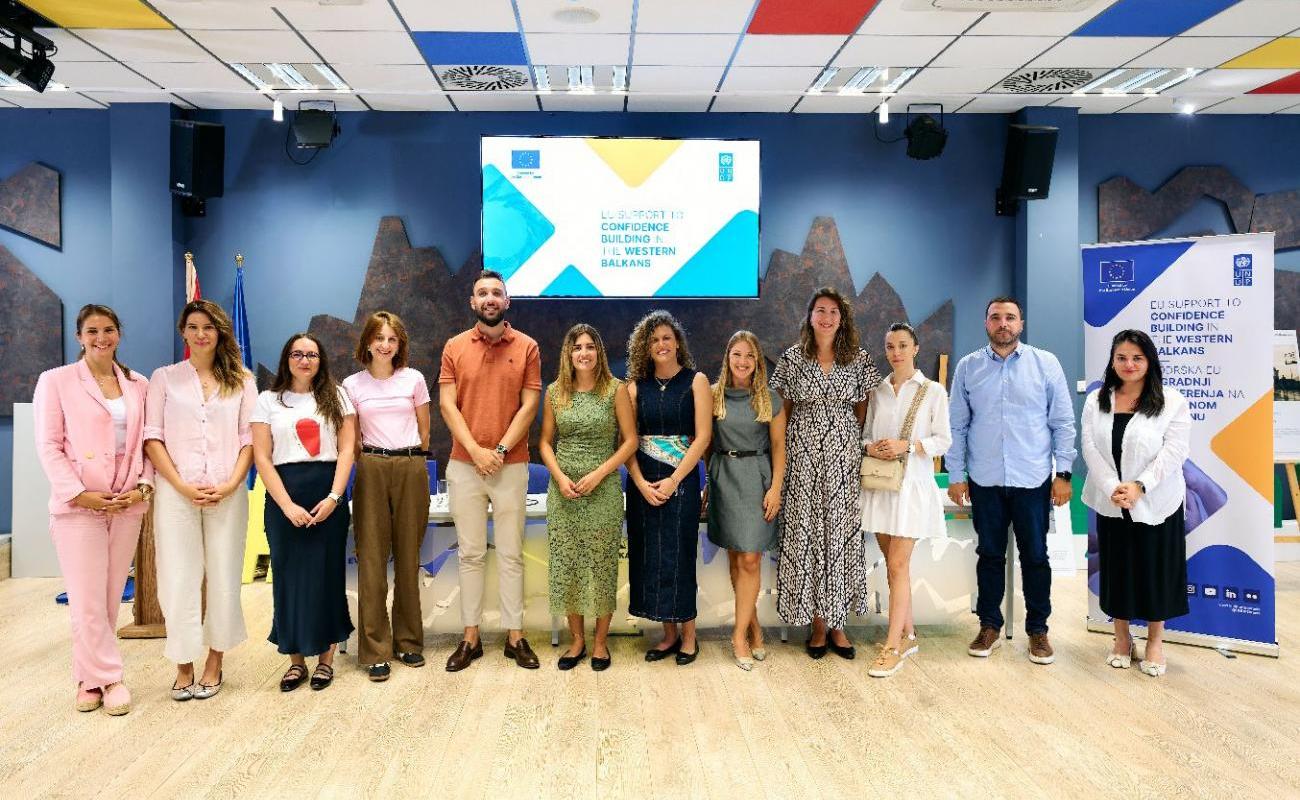EU Continues To Support Civil Society In Montenegro In Building Confidence and Promoting Transitional Justice

The European Union, in partnership with the United Nations Development Programme (UNDP) in Montenegro, continues to support civil society organisations that play a crucial role in advancing transitional justice, reconciliation, and social cohesion.
At an event held today at Europe House in Podgorica, four Montenegrin civil society organisations presented their projects, which have been awarded support through two public calls, with a total allocation of EUR 176,980, under the regional project “EU Support to Confidence Building in the Western Balkans.”
The first public call, launched on 24 January 2025 and closed on 24 February 2025, focused on projects addressing the legacy of the 1990s conflicts and fostering reconciliation and dialogue in the Western Balkans. Two projects were supported:
-
The Centre for Civic Education (CCE) is implementing the project “From Understanding the Past to Building Trust and Transitional Justice,” aiming to raise public awareness of war crimes, strengthen the culture of remembrance, educate younger generations, and improve media reporting on transitional justice. Maja Marinović explained that the project includes educational and media activities, as these topics are often overlooked in formal education. Through intergenerational dialogue, media analysis, podcasts, and opinion pieces, the project seeks to stimulate public debate and awareness of war crimes.
-
Human Rights Action (HRA) is carrying out the project “Together for Lasting Peace through Education, Dialogue, and Memorialization,” focusing on educating citizens about human rights and war crimes, promoting dialogue to overcome prejudice, and preserving the memory of victims. Elizaveta Mrnjačević noted that the project will include a series of intergenerational conversations capturing both personal and collective memories of war crimes. HRA also plans to create conditions for memorializing sites of suffering and to establish a digital archive of testimonies, with a special focus on women’s perspectives.
-
The second public call, conducted during the same period, targeted projects aimed at enhancing and protecting the rights of victims and survivors of the 1990s conflicts. Two projects were supported:
-
NGO Juventas, in partnership with the Alternative Theatre Active Company (ATAK), is implementing the project “Confronting the Past through Art, Education and Social Discussion,” using art, workshops, panel discussions, and other interactive formats to amplify the voices of victims and their families. Miloš Milačić announced that the project will include a theatre production about war crimes committed in Morinj, a three-day youth camp, and a television programme, all aimed at reducing ethnic distance among youth and highlighting the gender dimension of conflict.
-
The Youth Initiative for Human Rights (YIHR), in partnership with the Association Štrpci – Against Oblivion, is implementing the project “Mapping Memories through Dialogue and Victims’ Stories,” focusing on strengthening the rights and visibility of victims of war crimes and their families, improving access to justice and reparations, and raising public awareness of the situation of civilian victims in Montenegro. Kristina Žugić explained that activities will include providing legal, psychological, and social support to victims and survivors and their families. YIHR and partners also plan a regional networking event for victims, empowerment workshops, a study visit to Dubrovnik, and a journalism competition focused on victims’ rights and status.
In addition to grants for civil society organisations, Ivana Bogojević Mandić, UNDP Project Manager, highlighted the importance of regional cooperation and the ongoing support provided through the regional project to justice institutions to strengthen institutional and legal frameworks. She noted that support has been provided for drafting Montenegro’s new Strategy for the Investigation of War Crimes, as well as for building the capacities of judges and prosecutors through specialised training delivered in cooperation with the Centre for Training of Judges and State Prosecutors.
Vlado Dedović, Political and Legal Affairs Officer at the Delegation of the European Union to Montenegro, emphasised that all presented projects have a strong component of dealing with the past, which contributes to reconciliation and social cohesion, and that such initiatives also support the implementation of key reforms under Chapters 23 and 24, which are crucial for Montenegro’s EU accession process.
This initiative is part of the regional project “EU Support to Confidence Building in the Western Balkans,” funded by the European Union and implemented by UNDP, with the goal of promoting dialogue, reconciliation, and building trust among communities across the region.
